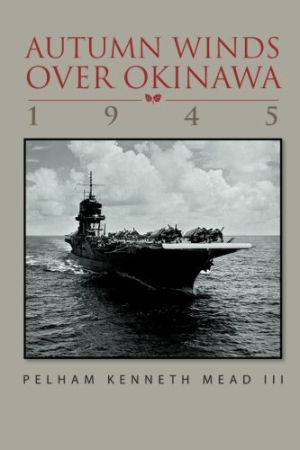Autumn Winds Over Okinawa, 1945
Autumn Winds Over Okinawa, 1945, by Pelham Kenneth Mead III, is a book in search of a genre. As presented, it is difficult to tell whether the volume is a memoir or historical fiction. Mead is a retired doctor and the son of the protagonist and narrator, Chief Petty Officer of Machinists Mates Ken Mead. The book tells the story of the tribulations endured by Ken Mead in 1945. Presumably the tale is reconstructed from stories the author’s father told after the war, though Mead never fully confirms this.
Ken Mead was assigned to the USS Antietam, a new aircraft carrier put into service in August 1944. A year later, the Antietam was headed east to attend the surrender of Japan proceedings when the ship was delayed in Guam for repairs. Since his period of service was nearly at its end, Ken Mead opted to be put ashore on Okinawa in late August to catch a ride on a ship headed back to Honolulu and eventually the United States. He spent nearly two months on the island, enduring privation, attacks by Japanese snipers, neglect by the United States Navy and Army, and two typhoons. His story is a brief but clear look into the chaos and horror of war.
When he arrived on Okinawa, Ken Mead discovered the navy had left the island and the army was not responsible for feeding or housing navy personnel. Mead was persona non grata with his own forces. Resourcefully, he made peace with the army and heard tales of the fighting that had occurred during the fierce battle for Okinawa: “During the ‘mop up operation’ in late June and early July of 1945 the American soldiers went out and hunted the Japanese like they were hunting rabbits. They took no prisoners and just shot all the Japs they could find.”
Unfortunately, the narrative is filled with repetitiveness, incorrect grammar, and poor sentence structure. Describing their difficulty getting food, the author writes: “Our K-rations had run out and we were dependent on the Army generosity in giving us food or we had to steal it without permission at night.” When talking about a typhoon, the narrator says: “By the third day typhoon ‘Louise’, had left its damage it behind on Okinawa.” Because of moments like these, the reader is often left to wonder about the author’s intended meaning.
It is possible that Mead is writing this story in the vernacular of his father, but there is no indication that this is the case. Most readers will likely feel that Mead would have been better off writing the book in conventional English, leaving readers the freedom to fill in the slang.
In the end, however, Autumn Winds Over Okinawa, 1945 remains an interesting and valuable tale. It gives the reader, now far removed from the events of the first half of the twentieth century, a first-hand glimpse into a small part of an enormously important period of American history. For this, Mead’s work is a story worth preserving.
Reviewed by
John Senger
Disclosure: This article is not an endorsement, but a review. The publisher of this book provided free copies of the book and paid a small fee to have their book reviewed by a professional reviewer. Foreword Reviews and Clarion Reviews make no guarantee that the publisher will receive a positive review. Foreword Magazine, Inc. is disclosing this in accordance with the Federal Trade Commission’s 16 CFR, Part 255.

